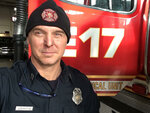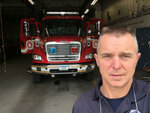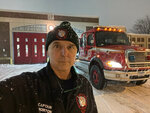By Jane St. Anthony
The distinctive wail of a fire truck rarely means what it did two decades ago. Author Jeremy Norton, fire captain and emergency medical technician (EMT) at Minneapolis Fire Station 17, makes that abundantly clear in “Trauma Sponges: Dispatches from the Scarred Heart of Emergency Response.”
In a bygone era, Norton notes: “Children glimpsed the heroism of fire fighters in books like ‘Clifford the Firehouse Dog,’ ‘Curious George and the Firefighters’ and ‘Busiest Firefighters Ever!’ ”
But fires are fewer now. With the advent of smoke detectors and sprinklers, 911 calls are more frequent. He has saved more lives as an EMT than he ever saved in fires.
Every call is treated as an emergency. Why? It’s an emergency because someone called 911, the emergency line.
“Our normal workday,” Norton writes, “includes death and dying, the dead, suffering visceral trauma, emotion and psychological anguish, multiple forms of self-inflicted wounds, economic and social injustice, race and class issues. These are facts.
“We are trauma sponges. Call after call, shift by shift, week by month by year, we absorb the boundless sadness and fear, the abuse, the blood and viscera, the sights and sounds and smells of tragedy and loss.”
The worst times may be carrying limp, lifeless children from shootings or wrecks or, sometimes, fires. Or when someone cries repeatedly, “Do something!” when a loved one is beyond resuscitation. Or a father turns on the TV for his young son in order to muffle sobs because his wife has died in the next room.
Yet in spite of what he faces, Norton goes to work, by choice.
“I don’t think about what’s to come; I have a band of brothers and sisters at the firehouse. We don’t know what we’re going to get on any day. But we have coping skills. We support each other. We stay grounded; we have families, children, dogs, gardens, lives. I never dread going to work; most of us don’t. I don’t think about what’s to come.
“The challenge, which no one explains in training, is that we must find a way toward grace, healthy acceptance and compassion while not losing ourselves in the world’s suffering.”
As for the culture: “The gruff old-school guys are gone from the station,” he said. “Although their legacy has seeped into the culture, it has diminished. We need grit and hustle, but we need brains and heart too. There’s positive change in the climate.”
What continues to stun him: how little the city leaders understand what’s going on in each of the city’s departments.
“There’s a comprehensive failure to investigate,” he writes. “What is happening in our society: so many acute emergencies and a frayed safety net for citizens.”
What should a mayor and others in office know about this and other disasters?
“I will say that it stuns me how little the city leaders understand what’s happening in all of the departments,” Norton said. “There’s a failure to investigate. That’s how cities operate. It’s a failed system.”
Then came COVID-19 which made the job harder in so many respects. How can a person administer CPR while masked?
“The challenge with CPR (cardiopulmonary resuscitation) during the heart of the COVID-19 pandemic was the aerosolizing of COVID germs due to compressions and ventilation,” Norton said. “Our face shields were intended to protect us. But there was no testing or guarantee that a mask hadn’t slipped or wasn’t porous.
“The emergency rooms were so crowded with COVID-19 patients that a triage decision – necessary and calculated – meant that someone found dead who didn’t revive within 15 minutes of ministrations on scene, he or she would be called deceased and not transported.”
Lives go on.
On one of his birthdays during the pandemic, Norton failed three times to blow out the candles on his birthday cake. After those three tries, he realized why everyone at the celebration was laughing. Norton was wearing a mask. He joined in the laughter.
The 354-pages of text in “Trauma Sponges” are heartfelt, brutal, timely, raw and fueled by the author’s insights into those he aims to save, which includes himself.




Comments
No comments on this item Please log in to comment by clicking here